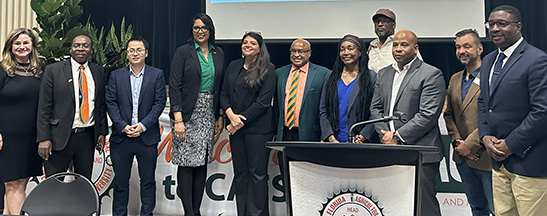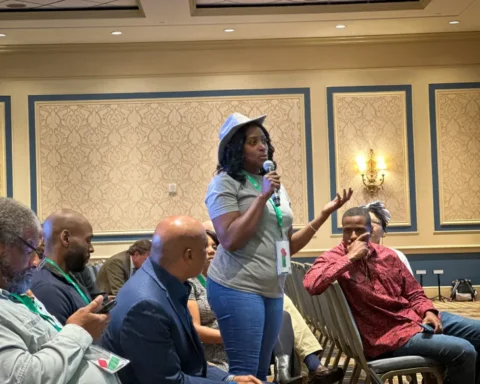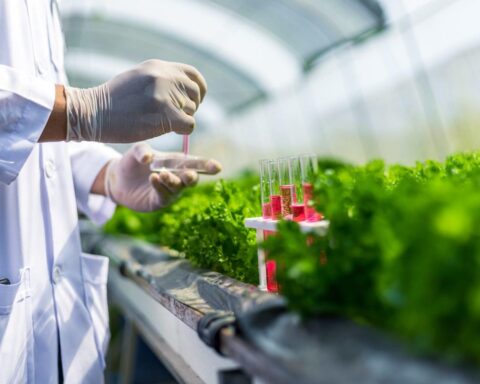By Kilisha Fain
A senior U.S. Department of Agriculture (USDA) official recently visited Florida A&M University (FAMU) to highlight the University’s receipt of three grants totaling $15 million as part of the federal agency’s Partnership for Climate-Smart Agriculture and Forestry Program.
On Wednesday, February 8, Gloria Montaño Greene, deputy undersecretary of farm production and conservation, spoke in front of a crowd of university leaders, faculty, staff, students, and partnering agencies. Farming producers in FAMU’s Perry-Paige Auditorium to discuss the partnership and recognize the investigative efforts of three FAMU researchers whose grant projects have been selected to receive funding to support climate-smart practices.
“We’re excited to celebrate what this wonderful investment means, and not just for Florida A&M University, but also for the development and strengthening of agriculture in making it more centered in some of the spaces it has not been previously,” said Montaño Greene. “Understanding the pipeline and the direction of how we’re moving forward with agriculture will help us serve better, learn from the past, and impact how we think and prepare, so we really thank you for this partnership.”
Montaño Greene said the decision to develop the grant opportunity came because of continuous feedback from the public.
“It was about a year ago today that the Secretary of Agriculture announced this opportunity for climate imprint,” she said. “We decided to create this funding opportunity in response to the constant theme of concerns and problems we heard from consumers wanting to know what agriculture is doing to mitigate or address climate change. There was a need to figure out how to do something different.”
The University of Arizona alum said the design of the grant application was developed specifically to ensure partnerships would be inclusive of rural and underserved communities.
“We put in the expectation that there was collaboration for partners who were used to serving underserved communities and that they had to consider it as part of their plan,” she said. “This was something we weighed into the scoring.”
The Arizona native said growing up in a rural community gave her first-hand knowledge about the impacts of agriculture and the importance of investing in communities.
“For many of us, it is our generational normal to have farming, agriculture, and to live in an area where the closest corner store is a 45-minute drive away and the closest grocery store is an hour and a half away,” she said. “For me, that was my normal.”
For this partnership, FAMU principal investigators will carry out fundamental research in climate-smart practices over the next five years, that will expand markets for climate-smart commodities, leverage the greenhouse gas benefits of climate-smart commodity production and provide economically viable climate-smart cropping options for small and underserved producers, ultimately benefiting the environment, agriculturalists, and manufacturing sectors.
During the three-hour event, each principal investigator highlighted details about their respective projects.
Odemari Mbuya, Ph.D.,an agricultural sciences professor and director of the FAMU Center for Water Resources, has been awarded $4.9 million and will serve as principal investigator, focusing on research that will improve the carbon sink by encouraging small and under-served farmers in the southeastern U.S., specifically Florida, Alabama, and Louisiana, to plant industrial hemp, a crop with high carbon sequestration efficiency and a climate-smart commodity crop.
Juzhong Tan, Ph.D., a CAFS assistant professor, received $4.8 million to investigate the development of biochar-based climate-smart practices and technologies that may be implemented on farms, especially on underserved areas, and to market the resulting climate-smart commodities.
Jennifer Taylor, Ph.D., a CAFS associate professor, was awarded $4.9 million and will lead investigations to advance equity by minimizing transaction costs and addressing cultural dynamics for Black and indigenous producers by using a farmer-to-farmer collaborative training approach.
“We understand the importance of the work that we do in agriculture and want to continue our efforts to emphasize that, which is why FAMU is proud to uphold the mission of the USDA”, said Allyson L. Watson, Ph.D., interim provost and vice president for the Division of Academic Affairs. “We know that America’s commodities produced using climate-smart practices are important as we move forward in this nation. This work allows FAMU, as an 1890 land-grant institution, to continue to focus on our work with small and underserved producers.”
In addition to each project lead’s core team, FAMU graduate students will be selected, recruited, and trained to assist with the research projects as part of their thesis.
Following presentations made by each principal investigator, Montaño Greene facilitated a question-and-answer discussion with students on issues impacting the agricultural sector, then participated in a brief tour of FAMU’s campus.
“Florida A&M University has shown up in all areas…the science, the research, and the capacity,” Montaño Greene said. “You guys have also shown up indirectly by asking how we can support the next generation of agriculture to be a part of this effort. Congratulations on almost $15 million on these projects. You are small, yet powerful, moving mountains with what you have to make ripple effects for generations.”
The grants are part of a $325 million federal investment in 71 projects under the second funding pool of the Partnerships for Climate-Smart Commodities effort. In total, the investment from both funding pools is more than $3.1 billion for 141 tentatively selected projects, which includes over 30 minority-serving institutions and groups dedicated to working with small and underserved producers.





